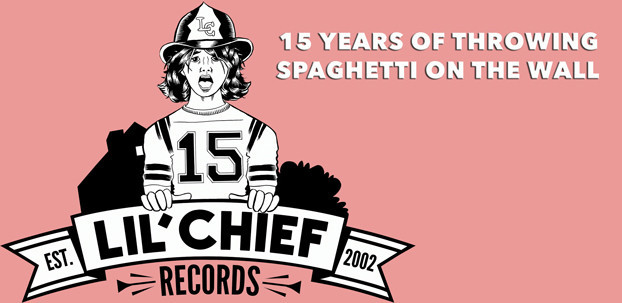
Reacting to local copycat acts and the macho rock revival of the turn-of-the-century, Lil’ Chief Records birthed a new kind of smart, ironic Kiwi indie-pop inspired by 1960s song and production auteurs like Brian Wilson, Phil Spector and Lee Hazlewood.
Lil’ Chief’s gestation began at Marbecks record store in Queens Arcade at the bottom of the Auckland CBD’s main drag. Jonathan Bree – who was serving time behind the counter – got into conversation with MAINZ-attending musician Scott Mannion, and discovered that they shared the same kaleidoscopic pop aesthetic.
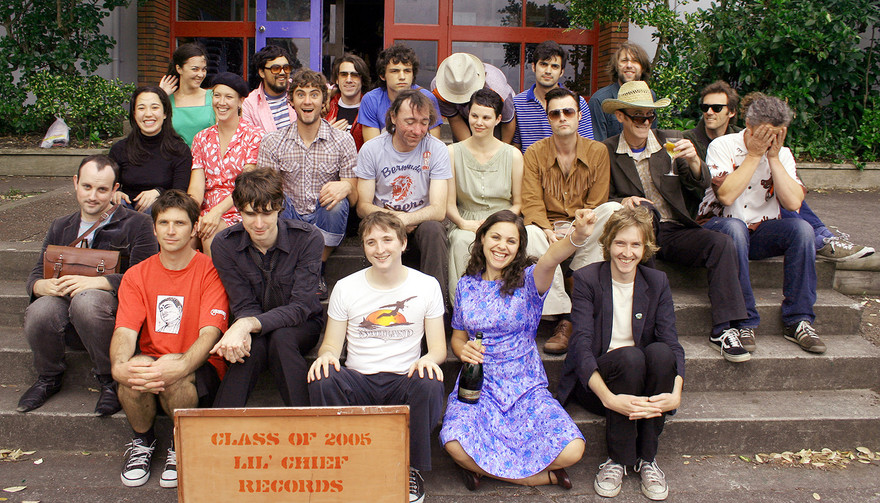
Lil' Chief, class of 2005. Back row: Heather Mansfield, Stu Kett, Brad Walkington, Sam Kett, Glen Casey, James Dansey, Ed Cake, Bob Frisbee. Middle row: Tosh Ahkit, Amee Robinson, Ryan McPhun, Bob Cardy, Dionne Taylor, Mark Lyons, John Payne, Tim Robinson. Front: Matthew Crawley, Gareth Shute, Jonathan Bree, Scott Mannion, Tamasin Taylor, James Milne.
It was an odd time for music in central Auckland, where dance music reigned supreme and clubs pumped feverishly to the “oonst” of house. Flying Nun’s lo-fi, alt-rock star had dimmed but there was a keen audience for the dirty, post-Zeppelin grind of bands like The Datsuns. This left a gaping hole for the kind of intelligent, knowing bedroom pop conveniently shared by Bree’s and Mannion’s respective bands: The Brunettes and the outfit that morphed from Polaar to Plasticene, and eventually into The Tokey Tones.
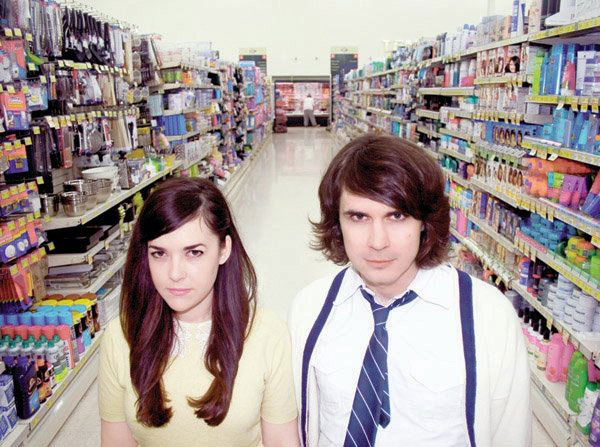
The Brunettes - Heather Mansfield and Jonathan Bree
It took a few years to build up a head of steam and for both to realise that the pop connoisseur obsessions built into the music of The Brunettes and The Tokey Tones, while organically finding a willing audience, would not be getting enthusiastic overtures from record companies anytime soon.
By 2002 The Brunettes – who had impressed with their limited edition Peter King lathe-cut EP in 1998 – had built a sizeable circle of admirers and completed their first album, Holding Hands, Feeding Ducks. Also, The Tokey Tones were deep into recordings that would make up the bulk of two simultaneously released albums of gentle, delicate folk-pop, Caterpillar and Butterfly.
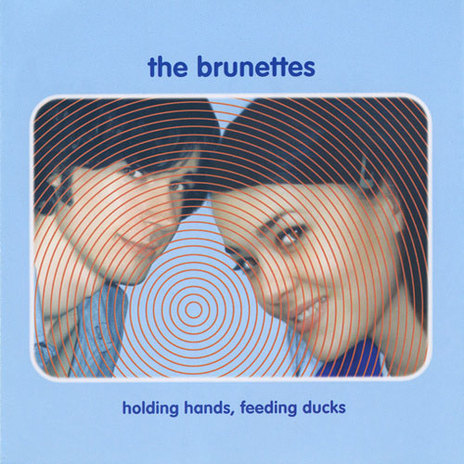
The Brunettes' 2002 album Holding Hands, Feeding Ducks was released on Lil' Chief Records via EMI.
“Jonathan and I continued to bond over music we liked and what we perceived as the sad state of the New Zealand music scene at the time,” says Scott Mannion. “It seemed like all the big bands were just a New Zealand version of whatever was popular in the USA or UK at the time. No way in hell would we ever get signed.”
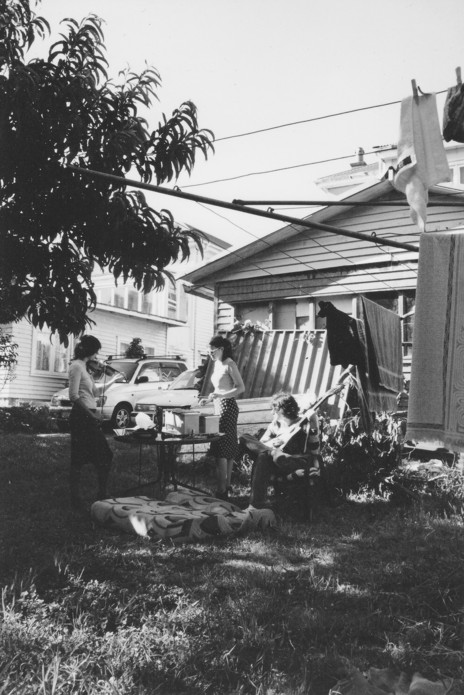
Heather Mansfield (centre) and Jonathan Bree practising with a new Brunettes member in the backyard of Lil' Chief HQ. - Photo by Gareth Shute
Bree continues: “Scott was getting together and recording material, and members of The Brunettes were helping with his band The Tokey Tones and vice-versa, and we’d finished our first album. We felt that we hadn’t found any real enthusiasm [from record labels]. We talked to Flying Nun for six months and thought that was all going ahead, but it didn’t in the end. It wasn’t that there weren’t good labels around, it’s just that they seemed very eclectic. And we were both in our early 20s and had always had romantic ideas about labels that had strong identities like early Flying Nun and Factory, which had one flagship band to draw attention, and then everyone benefits from that. So that was our blueprint for starting Lil’ Chief Records.”
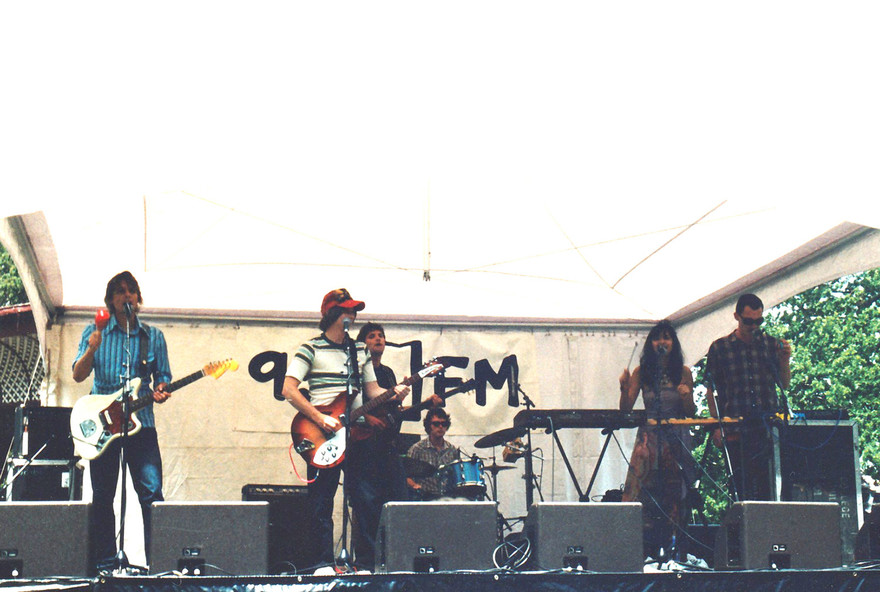
The Tokey Tones playing at 95bFM Summer Series, Auckland. L to R: Nick Buckton, Scott Mannion, Gareth Shute, Kari Hammond, Li-Ming Hu, Alex Still. - Photo by Tosh Ahkit
“Eventually, along with our friend Lawrence Mikkelsen, we hit upon the idea of starting our own label,” says Mannion. “Between the music of The Brunettes, The Tokey Tones and our friends The Nudie Suits and Shaft it seemed like there was something different and special there. Of course, as soon as we started Lil’ Chief The Brunettes ended up getting licensed to EMI in New Zealand, but we pushed on.”
Admirably self-contained and seemingly disconnected from any other local scene, Lil’ Chief quickly became an informal co-op of like-minded music-obsessives with an aesthetic that was as specific as it was hard to define. Early releases by The Brunettes, The Tokey Tones, The Nudie Suits and Edmund Cake all shared the same self-aware, lyrically astute, smart and ironic perspective. And although there was room for musical eclecticism – Shaft’s Open Sesame (2004) was noticeably different to the label’s other acts – the Lil’ Chief roster was more or less a repertory company of shared members and equipment and studios who all hung out together, so the music reflected that in its absence of bare-faced emotion and tendency towards ironic humour.
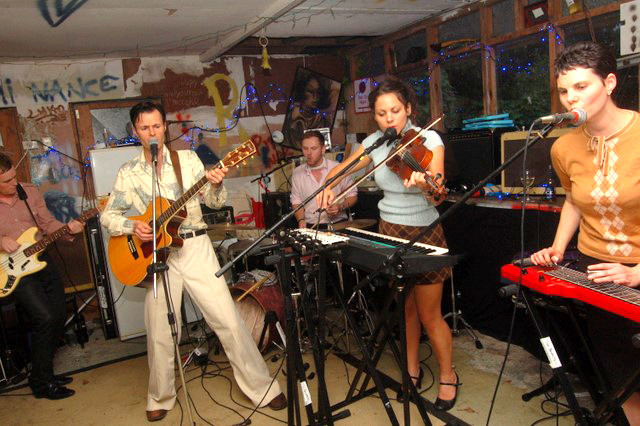
Nudie Suits at the Lil' Chief Xmas party: Mark Lyons with Tamasin and Dionne Taylor on fiddle and lap steel. Rob Collins is on bass and Ivan Luketina-Johnston on drums. - Photo by Petra Jane Smith
The Brunettes were the flagship Lil’ Chief act as they traversed the globe and received rave notices from august international music publications for their light and frothy bachelor-pad style and sharp wit, which defied its listeners to decree them satirists. Not that the group didn’t receive the odd brickbat.
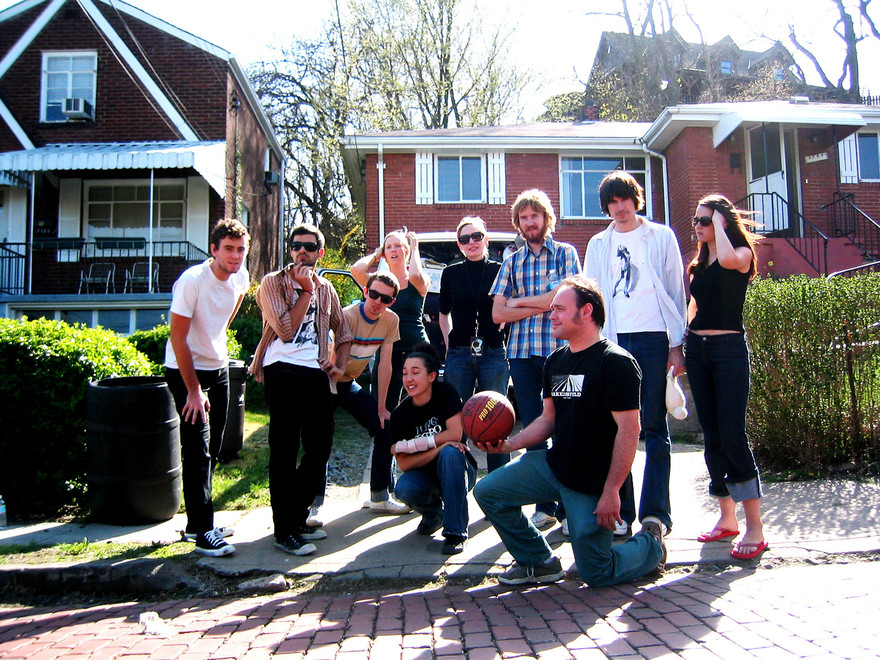
The Brunettes on their first US tour, supporting Sub Pop act The Shins. L to R: Ryan McPhun, James Dansey (soundman), Harry Cundy, Amee Robinson, Tosh Ahkit (kneeling), Melinda Olykan (manager), James Milne, an American friend, Jonathan Bree, Heather Mansfield.
“When we went to London I had never even heard the word ‘twee’,” says Bree. “I didn’t even know what it meant. I was like ‘what the fuck is “twee”?’ And they played me Belle & Sebastian and said ‘that’s twee and it’s been popular over here but it’s on its way out and that’s what people think you kind of sound like!’ And I was like ‘we don’t sound like that!’ I really wanted to create a kind of false innocence with the Brunettes early on, and borrowed heavily from The Carpenters, and a lot of people did take that as what we were like as people and our backgrounds. I assumed people would think ‘surely not!’ and pick up on the other elements. On face value I think we were kind of discarded by a lot of people as a twee band that irritated them, the cutesiness of it all.”
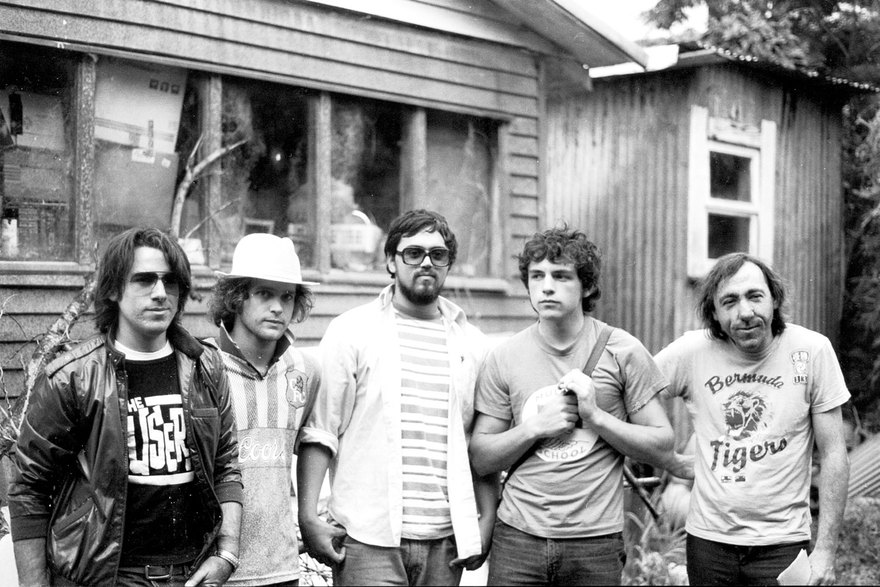
Shaft, pictured at the 2005 Lil' Chief Xmas party. L to R: Brad Walkington, Glen Casey, Stu Kett, Sam Kett, Bob Cardy. - Photo by Gareth Shute
Twee or otherwise, The Brunettes’ lustre rubbed off on Lil’ Chief’s other acts and inspired punters to check out the lesser known bands on its roster. So while the label’s leading group were in the ascendant internationally and touring incessantly, Mannion inevitably sacrificed his own artistic endeavours to quietly grow the label at home.
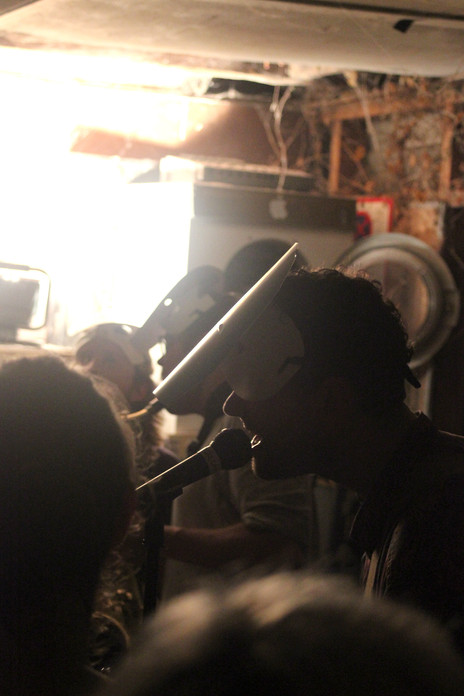
Ryan McPhun performing in Disciples of Macca, in the Lil' Chief garage. - Photo by Gareth Shute
While Lil’ Chief’s other artists weren’t anywhere near as self-consciously ironic as The Brunettes, they generally displayed anti-rockist tendencies, and many of its releases were semi-acoustic and gentle of sound, even if they were lyrically barbed. It would be fair to say that the Lil’ Chief roster was a group of friends who loved classic pop productions from the 1960s and 70s but approached it in an indie fashion, and unlike previous generations they weren’t ashamed of the easy listening, MOR tendencies that run through so much great pop.
“In the early 2000s in Auckland I felt that the live scene was pretty heavily focused on being a backlash to the dance music scene, so that 70s rock revival aesthetic was quite popular,” says Bree. “We knew personally and played a lot of shows with bands like The D4 and The Datsuns, and I liked their music, but we felt as though we were real outsiders. I suppose we were complete upstarts who thought we were so much better because we liked the Beach Boys. We were pretty elitist.
“People looking at early Brunettes might think ‘how the fuck did this ever happen in Auckland?’ but I think just living on K Road and getting completely bored of the ‘K Road cool’ at the time made me want to do something completely different and disappear into a fantasy world of Beverly Hills, 90210 or something. And maybe as a label we’re a bit wimpy like that. There’s not really any macho.
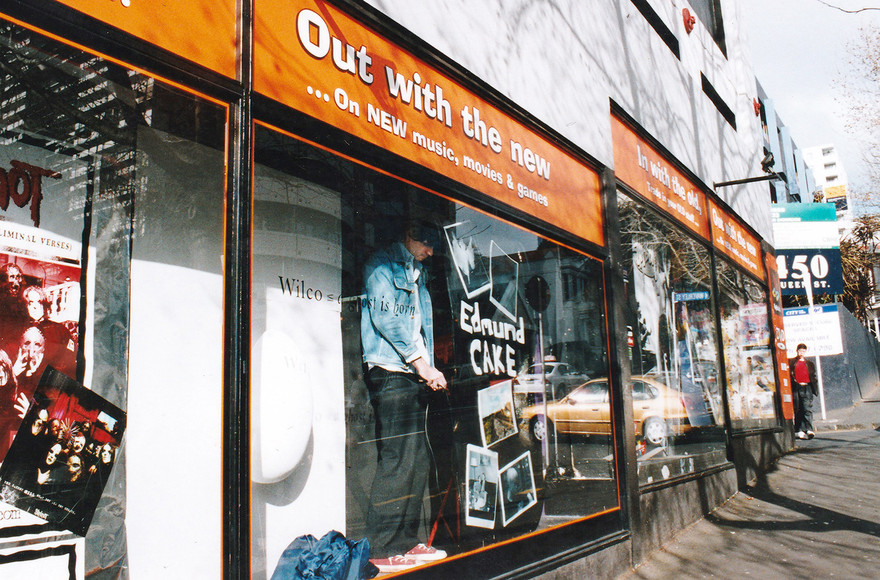
Jonathan Bree putting up a display in Real Groovy records in the DIY era of the label. - Photo by Gareth Shute
“I think it’s easy to look back and go ‘yeah, there was definitely a distinctive sound,’ ” continues Bree. “It’s quite valuable to put a tag on something like ‘the Dunedin Sound’ when it could quite loosely just be 60s garage or something like that. If you were in Dunedin in the early 80s it might have been, ‘we just like the Velvet Underground’ or something, but someone with a bit of marketing know-how went ‘no, there’s definitely a sound’, and there was. I think it’s easier for people outside of New Zealand to pinpoint that. When the Brunettes first started there was a bit of negative criticism of how American we were and how we focused on a lot of Americana, and I’m not denying that it wasn’t heavily influenced by the Beach Boys. We were honing in on sounds that I was heavily influenced by – whether it be Phil Spector or Brian Wilson or George Martin. But when I went overseas, people from those countries thought it was incredibly unique sounding and very much something that seemed otherworldly to them, so to them it was very representative of a New Zealand sound. Heather [Mansfield] sang with more of a New Zealand accent than me. I always liked Jonathan Richman too much and wanted to have that naïve Boston thing.
“I think the label is a little bit more eclectic than it used to be but we admire strong songwriting, a bit of wit in the lyrical content is common with a lot of the artists, and also cleverly arranged and often multi-layered orchestration is another theme. Bedroom recording artists is another theme. That’s common these days, but when we first started it was more like a tag.”

Princess Chelsea at the Wine Cellar, 2011 - Photo by Petra Jane Smith
Although Lil’ Chief has always maintained a low profile in New Zealand, a look at its discography from the first Brunettes album in 2002 onwards reveals an impressive output of almost 50 albums, from the off-centre pop of Edmund Cake and Lawrence Arabia to the post-Flying Nun endeavours of Alec Bathgate to Ryan McPhun’s distinctively oddball, electronically infused The Ruby Suns. And as the second decade of the new century beckoned there was a new wave of Lil’ Chief discoveries like Pikachunes, The Eversons, The Icypoles, Wet Wings and Princess Chelsea – not to mention the award-winning Sheep, Dog & Wolf and Jonathan Bree’s two solo albums.
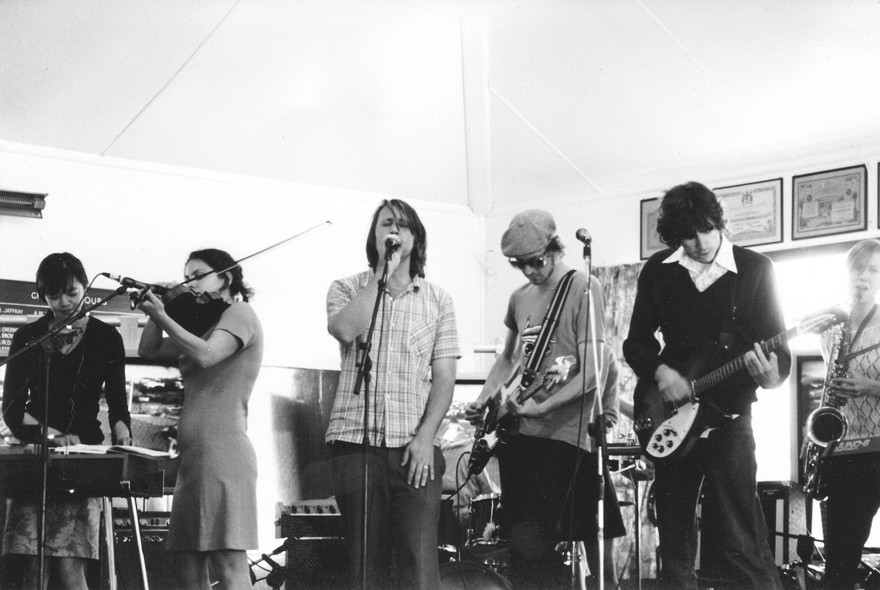
Lil Chief combined band play at a Public Address event at Grey Lynn Bowling Club. Li Ming Hu (Tokey Tones), Tamasin Taylor (Nudie Suits), Ed Cake, James Milne (Brunettes) and Amee Robinson (Ruby Suns). - Photo by Gareth Shute
That’s pretty impressive from a loose collective of bedroom music makers who have, for most of their 15-year existence, operated out of a dank flat in city fringe Kingsland known as ‘The Ghetto’.
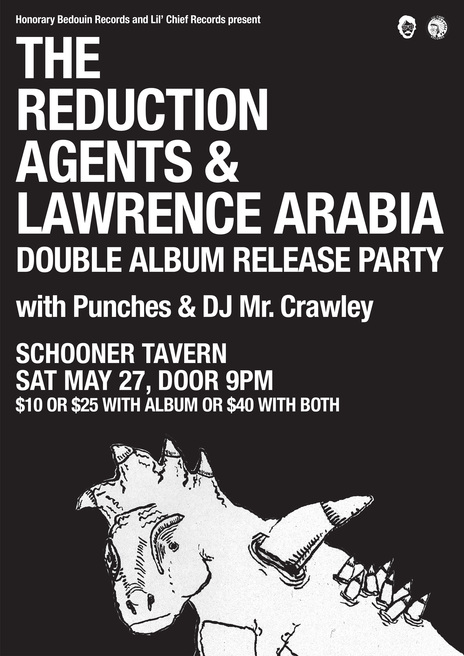
2006 Reduction Agents and Lawrence Arabia's joint album launch at Auckland's Schooner Tavern.
“We’re always a bit stretched because it’s a volunteer network,” says Bree. “That’s one of the reasons Lil’ Chief has kept going because everyone involved is in it not for financial gain. We just found the right group of people who decided that it gives their existence a bit of meaning. It’s something to do before we die. Lawrence Mikkelson is our mailorder/post guy. He’s brilliant and has been there right from the beginning and deals with all our orders. Scott Mannion deals with orders from Spain now. Gareth Shute has been incredibly helpful as well, right from the beginning.”
Ultimately, The Brunettes were perennially the “band most likely” that never quite found the crossover success that seemed to beckon. Then, co-leader Heather Mansfield met and married an American, and stayed there.
“When we started out Heather and I were together as a couple and when we broke up we kept it going, and it was quite painful,” says Bree. “And in our last year of touring, my partner Chelsea was in the band and so was Andrew, Heather’s husband, so we’d sort of become like Fleetwood Mac. It worked well, it was good having your partners in the band, but they had to put up with weird post-relationship dynamics as well.
“And as I got into my 30s the naïve ‘young love’ kind of stuff we were doing in The Brunettes started feeling a bit wrong. There were always darker undertones, but I thought ‘I’m getting a little over this now, and if I don’t feel genuine on stage then that’s wrong’. It was really just like the last little part of the Brunettes, it felt like it was a good time to wrap it up. We could have gone into an interesting ‘young divorcee ballads’ [phase] or something like that.
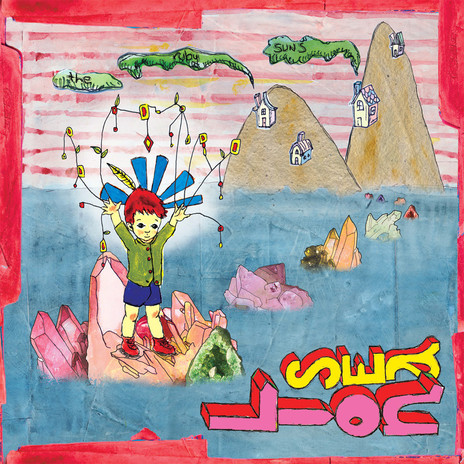
The Ruby Suns' 2008 album, Sea Lion.
“And although I was very ambitious to go and call America home or at least get a base of operations there, I ended up being the one that came back to Auckland after we’d tour. So creatively it got a little bit harder, and figuring out where we were going to rehearse before tours became more of a strain. We’d toured extensively for four years and it didn’t feel like we were going forwards. We were approaching each tour with less and less enthusiasm than the time before, because we were always still in a van, and we weren’t getting any younger, and by the end of 2009 I pretty much thought … what’s the point? I was starting to get so jaded that it was like ‘here we go again …’ And I felt guilty that I was doing something which was out of the ordinary and quite a privilege to get to do, but at the same time I felt so dead inside.”
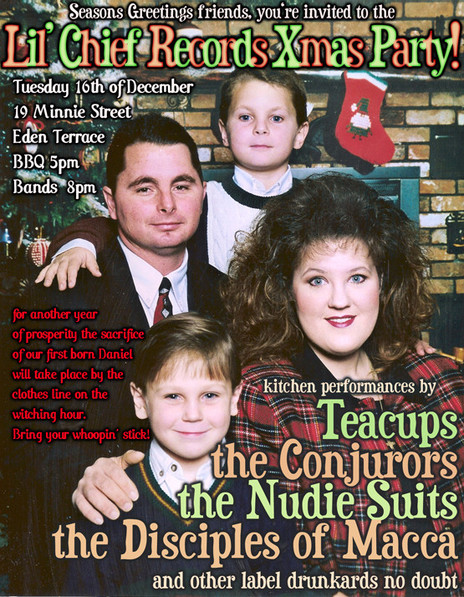
Lil' Chief Xmas party invite, 2003.
As it happened, the dissolution of The Brunettes was fortuitous for Lil’ Chief, because Scott Mannion’s move overseas required Bree to be in the driving seat locally.
“By 2008 I was anxious to see more of the world and moved first to Wales and then, in 2013, to a small town in Spain,” says Mannion. By 2011 we had started pressing vinyl and since it was much cheaper to do that in Europe and most of our online orders came from Europe and the USA, my apartment in Wales and now house in Spain have been the de facto Lil’ Chief warehouses.”
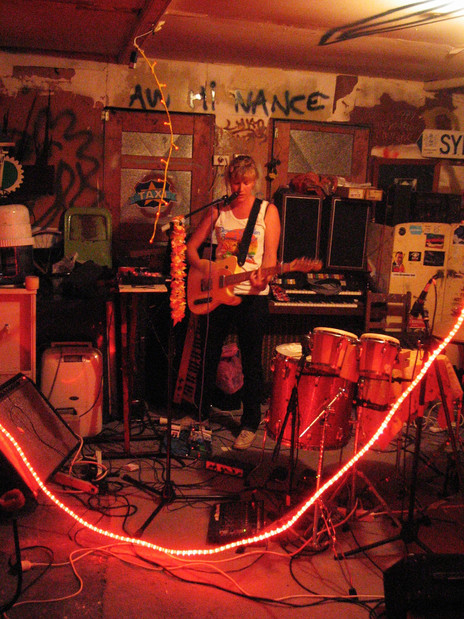
Amee Robinson of The Ruby Suns in the Lil Chief “ghetto” garage. - Photo by Gareth Shute
Mannion would continue to balance Lil’ Chief budgets and manage multifarious other tasks, while Bree found himself helping the label’s bands with advice and assistance and effectively becoming the A&R scout.
Bree oversaw the release of the Pikachunes (aka Miles McDougall) left-of-centre disco-oriented album in 2011 and subsequently helped with production duties on the fabulous psychedelic Cool Rainbows album (2012). While the earlier Lil’ Chief bands were in each other’s pockets, shared equipment and played together, latterly new signings have come from outside the gene pool. Sheep, Dog & Wolf, for instance, is the project of Wellington-based multi-instrumentalist Daniel McBride, whose beguiling, complex 2013 album Egospect won the Critic’s Prize at the New Zealand Music Awards.
The onward progress of Lil’ Chief was and remains dependent on voluntary labour, and it remains a label bereft of business pretensions. Business-savvy? Hardly. Their one canny move was to be internationally focused.
“We’ve never been proactive in marketing ourselves to New Zealand, or playing the industry game,” says Bree. “When we started we thought the best plan of attack would just be don’t worry about home, all we have to do is have a success story overseas and then that would pay off back home. And even with Sheep Dog & Wolf our main goal was getting him overseas and touring. He got to Europe, he got his album pressed up over there, and we found a few little distribution avenues for him. And all the things that have happened with him have trickled back to New Zealand. There was very little of trying to hype him in New Zealand, which is really great, because he’s actually doing really well over here.
“There are [NZ] labels that go to music manager meetings and network and have better PR but … I guess I don’t like to hit anyone over the head. We take a very non-confrontational way of trying to get attention. If someone wants a review copy we’ll send it out, and we do put a press release out but we don’t get on the phone and take people out for lunch. All we’ve really concentrated on is making sure that we work with artists we feel will do well overseas, and in finding their niche market overseas, if we can help with that in any way then that’s what we like to do. It’s always been internationally focused, and we make more sales through our mail-order system sending stuff overseas than we do making sales at home, for all of our artists.”
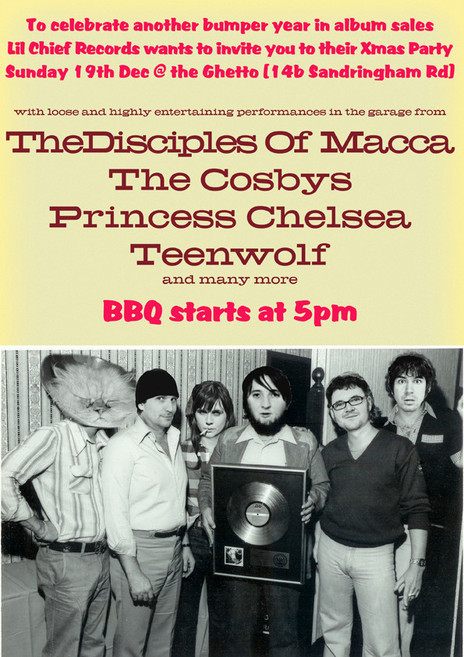
Lil' Chief Xmas party invite, 2010.
And in the spirit of the label, Lil’ Chief simply licenses material with the intellectual copyright remaining with the artist.
“We don’t pretend to be businessmen. We’re pretty open with our artists about what we’re capable of so we normally don’t get anybody on board that’s expecting … I guess we started as a collective, we were all close friends, and now it’s become something slightly different because we’re working with artists that we don’t actually know on a personal level but we really aesthetically like their stuff. We have contracts which have terms on them and then the artists get their recording back, they own their own stuff, because we don’t know if we’re going to get disillusioned by this thing at some point in time and want to end it. And I’d feel awful if I signed someone and their legacy was being sat on. Everyone gets everything back at the end of the day, so that’s good for them.”
He sees the label as an evolving network of bands and musicians nurturing themselves and furthering the label through their association with it. “If the label isn’t too eclectic then just one band getting noticed will open up the doors for everyone.”
And although Lil’ Chief got underway well before the advent of YouTube, it’s become the perfect tool for getting the word out. Several of their clips have become runaway YouTube phenomenons, which means that whatever other Lil’ Chief acts appear in the sidebar get a hefty bump in views as well. Princess Chelsea’s ‘The Cigarette Duet’ (2011) has received an astonishing 47 million views, and Jonathan Bree’s ‘You’re So Cool (2017) is already well on its way with over 12 million views.
The low-key nature of Lil’ Chief means that there are no high stakes risks and no industry games to play, so their plan is just to continue.
“Hopefully the merits of our new artist signings will see them finding a place in the world. All it requires is new people coming along and helping the label evolve. And there might be a point in time where one of them really strikes gold. We’ve been lucky enough to have our artists have some success. The Brunettes and The Ruby Suns and those initial bands have helped get attention for Princess Chelsea, for instance.”
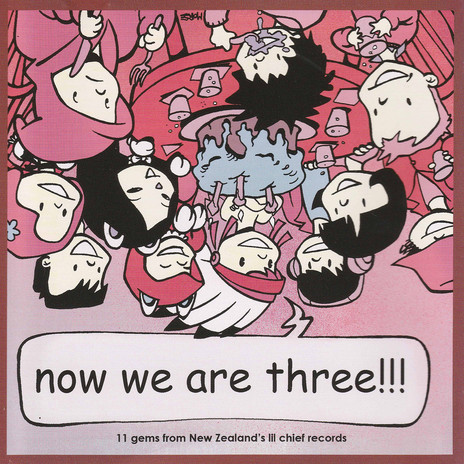
2005 Lil' Chief compilation Now We Are Three, with cover art by Simon Morse.
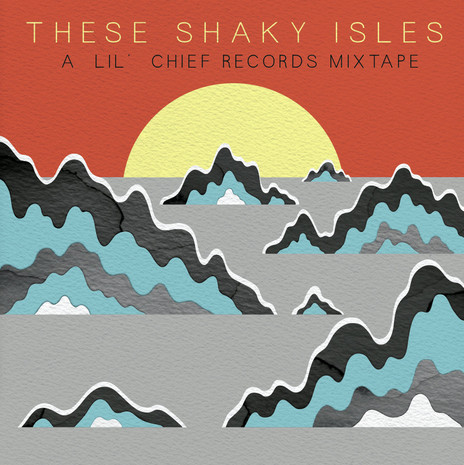
Lil' Chief compilation These Shaky Isles, 2012.
The label refuses to slow down, with Princess Chelsea (aka Chelsea Nikkel) having toured Europe and the US on the back of her huge online following, and like many record companies, a reissue campaign focusing on vinyl that has seen a reissue of the Reduction Agents’ (aka James Milne aka Lawrence Arabia) classic The Dance Reduction Agents (2006) as well as a tribute album featuring contributions from Liam Finn and Tiny Ruins. And to mark the 15th anniversary of Lil’ Chief, the label’s first-ever release, The Brunettes’ Holding Hands, Feeding Ducks was issued on vinyl for the first-time ever in October 2017.
But what of the current artistic personas of the two chaps who met back in 1998 and still remain pals and Lil’ Chief label heads?
Jonathan Bree has released two solo albums since The Brunettes came to a grinding halt, both of them critical landmarks: The Primrose Path (2013) and the subdued A Little Night Music (2015); latterly his ‘You’re So Cool’ video (2017) from his forthcoming solo album, Sleepwalking, has become a YouTube favourite.
In 2017, only 14 years after the two Tokey Tones albums were released, Scott Mannion released the first of two singles from his forthcoming solo album, Loving Echoes. “I had been writing and recording and rejecting songs for years,” he says, “but now my phone voice memo app was bursting with too much stuff and I needed to purge. In the process my relationship of nine years ended, which of course led to a flood of new songs, before I met my now fiancée and yet another flood.”
--
Links
Lil' Chief Records - official website
Lil' Chief discography at Wikipedia
Lil' Chief Records - YouTube channel
Gary Steel's Witchdoctor - Disciples of Macca
Gary Steel's Witchdoctor - Cool Rainbows review
Trivia
Lil’ Chief Records has licensed several overseas albums for New Zealand release, including Japanese tunesmith Shugo Tokumaru’s gorgeous lysergic folk-pop release L.S.T (2006) and lo-fi Australian Architecture In Helsinki breakaway group The Icypoles’ My World Was Made For You (2014). Scott Mannion was a big fan of Tokumaru, and felt that “it was an interesting take on organic sound but manipulated,” while Bree agreed to release The Icypoles album during a party Architecture In Helsinki put on for The Brunettes in 2003. “Ten years later Isobel Knowles emailed and said, ‘remember you said you’d put out our album?’”
Disciples Of Macca was a bizarre tribute band made up of Lil’ Chief band members who performed hilarious covers of Paul McCartney and Wings songs while wearing “Macca” masks.
Jonathan Poneman from Sub Pop Records became interested in Lil’ Chief in 2005 and met with the label several times on visits to New Zealand. This helped The Brunettes and The Ruby Suns to subsequently sign to Sub Pop.